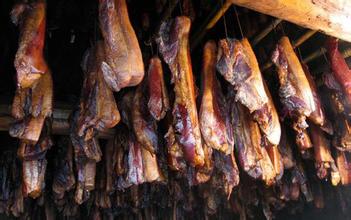To the Miao ethnic groups, Souse Fish and Smoked Meat are more than just food.
對純樸的苗家人來說腌魚臘肉,不僅僅是一種食物。
They are part of their lives and memories to be remembered by history.
而且是被保存在歲月之中的生活和記憶。
If we went to school, we had to get up before 4:00 am.
一般我們要是趕課的話,就是早上三四點鐘就要起來。
My mum accompanied me at first.
我媽媽早上三四點鐘就開始送我。
After we crossed several hills, the day broke.
送我送了幾個坡以后,那個天魚肚白的時候。
She said, go to school yourself.
她就跟我說,她說滿女,你自己走吧

It's getting brighter.
現在天快亮了,你就自己走吧,這個天是越走越亮的。
I have some housework to do.
我要回家做事兒去了。
Then I plucked up courage and went to school by myself.
然后我就壯著膽子走。
Souse fish and smoked meat have accompanied the Miao ethnic girl even if she has had a new world.
臘肉和腌魚曾經陪伴著苗族少女走出一片新的天地。
Huizhou people, who also live in mountains, have their own understanding of souse fish.
而同樣穿行在崇山峻嶺中的徽州人對腌魚卻有著自己的心得。
Smelly Chinese Perch is a typical Hui dish cooked with strictly selected ingredients.
徽州的臭鱖魚是徽菜的一個代表菜,現在臭鱖魚的制作在選魚方面是相當講究的。
When peach trees blossom in March and April, it's time to fish.
一定要選用三四月份桃花盛開的季節(jié),這個季節(jié)的鱖魚是最肥的。
Fish caught during this period taste best.
魚質是最鮮美的時候。
Huizhou is the birthplace of Hui merchants and Huizhou Culture.
這里是徽商故里和徽文化的發(fā)祥地。
In ancient times, local residents had to leave the small but populous Huizhou to make a living far away from home.
由于古徽州地少人多,居民們不得不離鄉(xiāng)背井走出深山去闖世界,求生存。
The food they carried that were made through air-drying or smoking processes were easy to preserve during a long trip.
而他們在路途之上的食物也不得不經過風干和腌制以便于保存和攜帶。
For example, "Laba Tofu" is as hard as a discus, but it can be preserved for quite a long time.
比如徽菜里的臘八豆腐雖然像鐵餅那樣堅硬。
But food would always go bad.
但保質期卻可以很長,食物放久了終究會發(fā)酵變臭。
Unexpectedly, rotten food have created a new flavour.
不過,久而久之腐敗竟然也成為味道的一種。
Stinky dishes, like Smelly Tofu and Hairy Tofu, have become something that distinguishes Hui cuisine.
比如臭豆腐,比如更為極致的“毛豆腐”,嗜臭于是也成為徽菜的一個獨有的特征。
The skin of well-salted Chinese Perch is aerugo.
臭鱖魚腌制好了以后。
The gills appear red.
魚的表面變成銅綠色,魚鰓是發(fā)紅的。
It smells bad, but tastes good.
你聞起來臭但吃起來特別地香。











